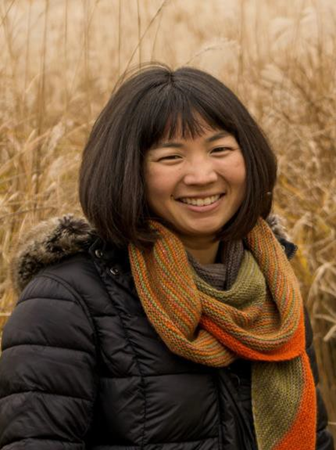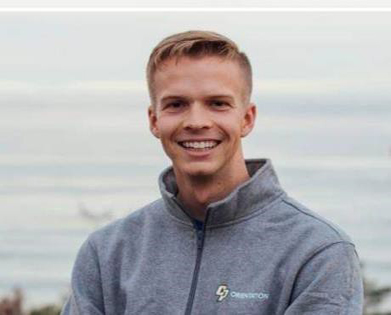Spring 2019 Alumni Updates
Ben Christensen
By Olivia Wiemann
 Ben Christensen (Environmental Management and Protection,’18). He is pursuing a master’s degree in environmental management at the Yale School of Forestry and Environmental Studies with specializations in business and the environment, and climate change science and solutions. Christensen entered as the youngest member of the program. “It has further instilled how much I have to learn, and the knowledge and experience of my peers has become one of my greatest resources,” he said. “I am both humbled and encouraged to be a part of this community and hope to leverage my position to make as large of a positive impact as possible.”
Ben Christensen (Environmental Management and Protection,’18). He is pursuing a master’s degree in environmental management at the Yale School of Forestry and Environmental Studies with specializations in business and the environment, and climate change science and solutions. Christensen entered as the youngest member of the program. “It has further instilled how much I have to learn, and the knowledge and experience of my peers has become one of my greatest resources,” he said. “I am both humbled and encouraged to be a part of this community and hope to leverage my position to make as large of a positive impact as possible.”
At Yale, Christensen is working on implementing the Carbon Charge, the first internal university carbon pricing system. Through this work -- part of the Environmental Stewardship Committee -- he manages energy systems analysis for the School of Forestry. He is also working on a carbon removal startup, implementing novel pyrolysis technology to produce bio-oil and bio-char. Christensen leads the Climate Change Student Interest Group (SIG) and recently helped put on a panel showcasing the Fourth National Climate Assessment detailing the impact of climate change domestically. Along with the Climate Change SIG, he is helping to organize the Yale Carbon Removal Conference.
When asked about his goals, Christensen said, “My life’s work is contributing as much as possible to global carbon negativity by 2060. As delineated by the recent United Nations Framework Convention on Climate Change (UNFCC) 1.5°C warming point (suggest deleting this yellow highlighted portion. It’s not grammatical; doesn’t make sense as written. Not sure it adds anything important to the quote), unless the global economy is decarbonized in the next 12 years, all pathways that avoid catastrophic climatic impacts include carbon negativity in the latter half of the century.” Looking toward the future, Christensen hopes to leverage his technical understanding into real-world impacts through a greater understanding of effective policy, value driven finance, and social enterprise innovation to reach this goal.
Richard Dennis
By Olivia Wiemann
 Richard Dennis (Forestry and Natural Resources, ’05) is president of EP Aeration in San Luis Obispo, a company he interned for after graduating from Cal Poly. EP Aeration focuses on biological water treatment, algae control, and wastewater treatment and sells a variety of products, including air and ozone delivery systems. The company recently started to manufacture its own products, including some that are solar powered. Dennis said that Cal Poly’s Learn by Doing style, as well as his background in forestry and botany, allows him to take a more diverse approach to the problems he encounters in the field. He enjoys having a flexible schedule that allows him to travel. Specifically, he is looking forward to an upcoming surfing trip to Chile.
Richard Dennis (Forestry and Natural Resources, ’05) is president of EP Aeration in San Luis Obispo, a company he interned for after graduating from Cal Poly. EP Aeration focuses on biological water treatment, algae control, and wastewater treatment and sells a variety of products, including air and ozone delivery systems. The company recently started to manufacture its own products, including some that are solar powered. Dennis said that Cal Poly’s Learn by Doing style, as well as his background in forestry and botany, allows him to take a more diverse approach to the problems he encounters in the field. He enjoys having a flexible schedule that allows him to travel. Specifically, he is looking forward to an upcoming surfing trip to Chile.
Emma Chow
By Charlotte Miranda
 Alumna Emma Chow (Environmental Management and Protection, ’09) has been with the Department of Agriculture’s Natural Resources Conservation Service (NRCS) since graduating. NRCS is a federal agency of the USDA focused on “helping people help the land” by implementing voluntary conservation on private farms, ranches and nonindustrial forest land. Chow has a wide range of experience with vineyards, orchards, forests and diverse crops from her time working in NRCS offices up and down California’s coast in Mendocino, Sonoma, Marin, Napa, San Luis Obispo and Santa Barbara counties.
Alumna Emma Chow (Environmental Management and Protection, ’09) has been with the Department of Agriculture’s Natural Resources Conservation Service (NRCS) since graduating. NRCS is a federal agency of the USDA focused on “helping people help the land” by implementing voluntary conservation on private farms, ranches and nonindustrial forest land. Chow has a wide range of experience with vineyards, orchards, forests and diverse crops from her time working in NRCS offices up and down California’s coast in Mendocino, Sonoma, Marin, Napa, San Luis Obispo and Santa Barbara counties.
She is familiar with disaster response, having most recently served as the district conservationist in Napa, where she assisted with post-fire recovery in Napa and Sonoma counties following the 2017 wine country fires. As the current district conservationist in Santa Barbara County, she works to deliver natural resources conservation services and financial assistance to farmers and ranchers through a collaborative and nonregulatory approach. Outside of work, Chow enjoys rowing and chasing sunsets.
Drew Loganbill
By Charlotte Miranda
 After graduating, Drew Loganbill (Forestry and Natural Resources, ’03; M.S., Forestry Sciences, ’13) joined the Peace Corps. He volunteered for three years as an environmental education advisor in the Fiji Islands. He returned to Cal Poly in 2009 to earn a master’s degree in forestry sciences. During his postgraduate studies at Cal Poly, he conducted research at Cal Poly's Swanton Pacific Ranch. After the watershed he was studying experienced a wildfire, his focus shifted from looking at suspended sediment concentrations after timber harvest to sediment production and suspended sediment transport the first year after a wildfire.
After graduating, Drew Loganbill (Forestry and Natural Resources, ’03; M.S., Forestry Sciences, ’13) joined the Peace Corps. He volunteered for three years as an environmental education advisor in the Fiji Islands. He returned to Cal Poly in 2009 to earn a master’s degree in forestry sciences. During his postgraduate studies at Cal Poly, he conducted research at Cal Poly's Swanton Pacific Ranch. After the watershed he was studying experienced a wildfire, his focus shifted from looking at suspended sediment concentrations after timber harvest to sediment production and suspended sediment transport the first year after a wildfire.
Upon completing his graduate research thesis, Loganbill began working at the Department of Agriculture’sNatural Resources Conservation Service and is now a district conservationist based in Petaluma, California. He works with both Marin and Sonoma counties, assisting forest landowners and agriculture producers with protecting and conserving their natural resources. He is the main contact to assist with forestry projects, including fuel load reduction, forest stand improvement, rural road improvements to address soil erosion, and sedimentation to watercourses. He also works with ranchers and farmers to improve grazing management, rangeland health, dairy nutrient management, organic crops diversity, vineyards and orchards. His observations and research of the wildfire at Swanton Pacific Ranch provided him with the experience and knowledge to assist landowners in fire recovery from the recent wildfires. The Sonoma County and Napa County fires were devastating to the community, and he was happy to have a part in educating landowners about the local ecosystem’s adaptations and recovery.
Chris Howington
By Charlotte Miranda
 Chris Howington (Environmental Earth Science, ’18) began working as a researcher for the Frost Undergraduate Summer Research Fellowship, studying fire ecology and plant diversity on geologically distinct soils after the Poly P fire. He was recently hired as a soil conservationist for the USDA Natural Resources Conservation Service in Modesto,
Chris Howington (Environmental Earth Science, ’18) began working as a researcher for the Frost Undergraduate Summer Research Fellowship, studying fire ecology and plant diversity on geologically distinct soils after the Poly P fire. He was recently hired as a soil conservationist for the USDA Natural Resources Conservation Service in Modesto,
California, where he works with farmers and landowners on environmentally beneficial land management practices. His work includes managing contracts regarding air quality, irrigation, erosion, soil health and pollinators. Howington’s aspirations include a career in restoration ecology and freshwater ecosystems, as well as graduate school. His hobbies include hiking, camping, basketball, and of course, visiting San Luis Obispo.
For more stories, read the rest of our Spring 2019 Newsletter



 Open: M - F 8am - 5pm
Open: M - F 8am - 5pm